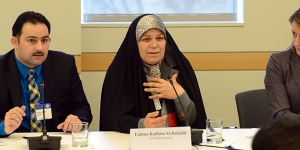What's Happening in Conflict Resolution [02.24.15]
"What's Happening in Conflict Resolution" is a weekly round up of the all the ADR news, jobs, events and more. Check it out each week and view past versions [HERE].
New Book: The Conflict Paradox: Seven Dilemmas at the Core of Disputes
by Bernie Mayer- I am pleased to announce that my new book, The Conflict Paradox: Seven Dilemmas at the Core of Disputes, is now available, and I hope you will take a look at it.
The book explores how we understand the choices that conflict presents us with as more complex than simple alternatives. Such as, do we:
- Compete or co-operate?
- Apply cold hard logic or give in to our emotions?
- Stick to principles or compromise?
- Avoid or engage?
We know that the choices are more complex – and far more interesting - than these simple polarities.
Read more [HERE].
Rotary clubs offer fellowship for peace and conflict resolution study
Rotary Clubs in the area are seeking candidates for a post-graduate fellowship to study abroad in the area of peace and conflict resolution. The Rotary International World Peace Fellowship, which culminates in either a master’s degree or a Professional Development Certificate, is now available for the academic years 2016-2018 at one of five universities in England, Japan, Sweden, Australia, or Thailand.
Read more [HERE].
NYC Litigator’s Book Coaches Readers to Resolve Conflict Without th...
Attorney Nance L. Schick knows conflict. As a litigator for nearly 13 years, she has watched parties struggle to resolve more than their legal actions. Knowing that mediation and coaching could make huge differences in the parties’ cases and in their lives, she was sad to see how infrequently alternative dispute resolution (ADR) was used. “In some litigation circles, attorneys consider ADR an acronym for ‘already declining revenue’,” she says. “They seem to think that if we teach too many people how to resolve conflict they won’t need the courts anymore. I’m willing to take that chance.”
Eight years after she first presented her proprietary Third Ear Conflict Resolution Program™, Schick has published a book that uses the program to coach and empower readers to do it themselves (DIY). Through her storytelling as lawyer, victim and coach, DIYers will discover how to make simple choices in their approach to conflict so that not every issue has to become “a federal case”—or a court case at all.
Not so secretly, Schick knows that there will always be conflicts we cannot avoid. She speaks about this in the ‘Introduction to Third Ear Conflict Resolution’ video on YouTube,
Read more [HERE].
7 Essential Ingredients for Resolving Workplace Conflicts
Workplace conflicts can be very disruptive. Dealing with them is not an easy task, either.
That’s probably because we’re all human beings and have an almost in-born, deep-seeded need to be right all the time.
Worse, when we’re wrong, most of us absolutely hate to admit it.
Mix these two very human qualities together with a few other ingredients and you have a full-scale blowout in the workplace that will not only disrupt those involved, but anyone within shouting distance!
Here are a few of the essential ingredients needed for a zippy resolution when resolving workplace conflicts to (almost) any problem that erupts between two or more people in your workplace.
1. “No Time Like the Present”
2. Try to be Discreet
The worst place for a conflict resolution to take place is in front of an audience. Emotions get in the way, eye contact is harder to maintain, embarrassment sets in, people interrupt and want to offer their limited viewpoint on the argument or worse, to choose sides. Find a neutral area where you can both be calm and focused on each other.
3. Smile
Check out this Forbes piece on the untapped power of a smile. There is no need for me to go into a long, drawn out explanation about why even a half-attempt at a smile is far superior to a scowl. Just like active listening, smiling during a conflict resolution is very difficult to do. It’s something that all politicians need to master in order to be successful.
Check out the full list [HERE].
Ombudsman: United Nations Development Programme
UMass Boston Professor Darren Kew Talks About al-Shabaab's Threats ...
Achieving Success in Negotiations - Lessons from the Minsk Negotiat...
Jillian Post- You've got your Christians, your Muslims, your Jews, your Atheists, your Agnostics, your dogmatists, your "pseudo-ists" and about everything in between. Some show great tolerance and some shout from a pedestal, leaving no room for any interpretation but their own. How important is one's religion when it comes to conflict? It feels like sides are being drawn. And we haven't even begun to figure out how to moderate the extreme influences of groups like ISIS. (Do they belong in this conversation?) Oh yes, yes they do.
Read more [HERE].
Money Matters in Mediation
About
@ADRHub Tweets
© 2026 Created by ADRhub.com - Creighton NCR.
Powered by
![]()





You need to be a member of ADRhub to add comments!
Join ADRhub